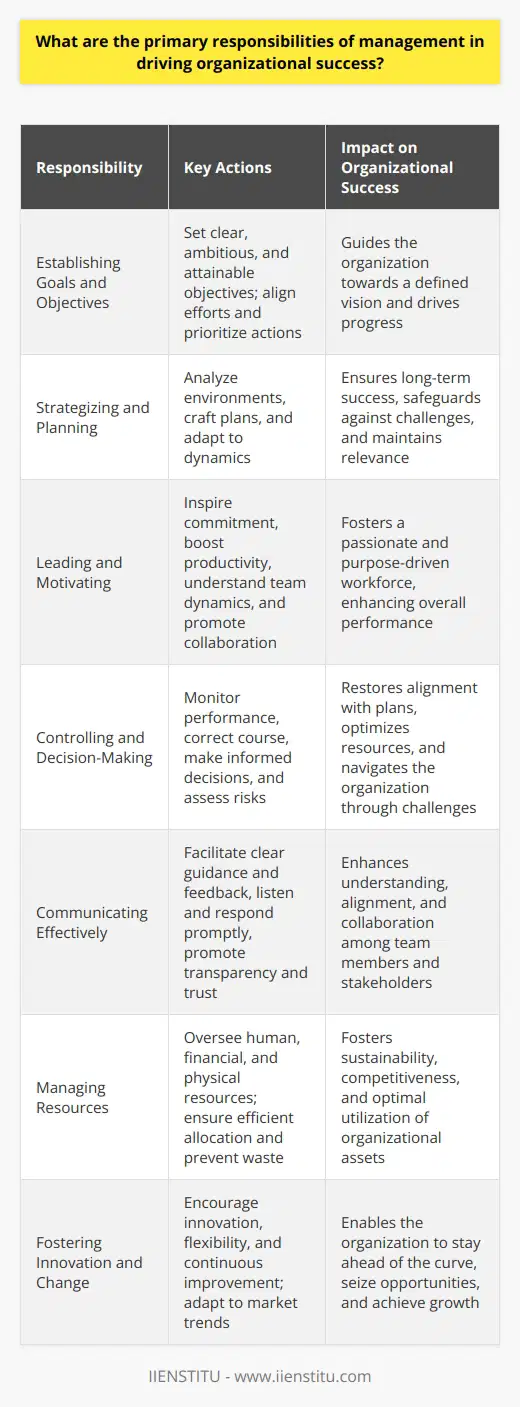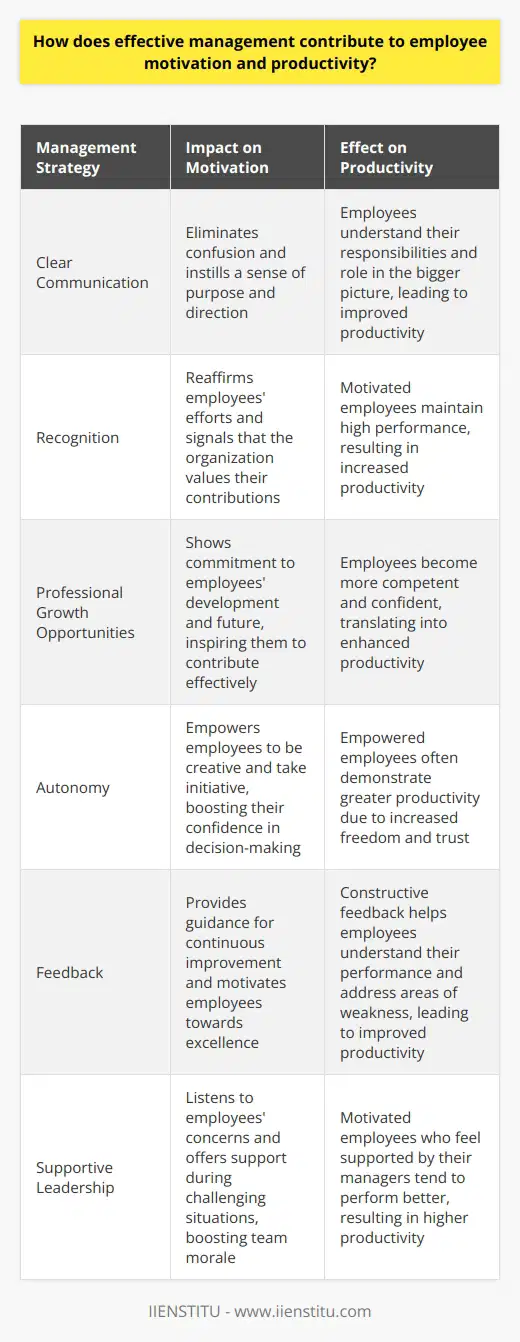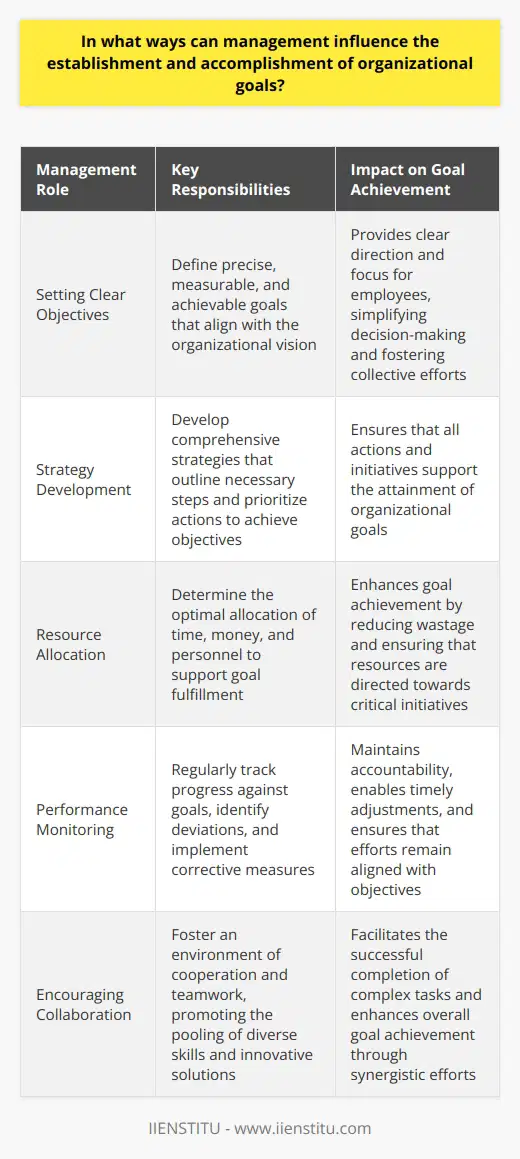
Management plays a critical role in the success and resilience of organizations. With a strategic blend of planning, leadership, and oversight, good management shapes the trajectory of a company, influencing everything from daily operations to long-term goals. This blog post, titled "Management's Key Role in Organizational Success," explores the intricate web of responsibilities that management carries and how their effective execution drives organizational triumphs. As we delve into this in-depth analysis, we will consider various angles—from strategic decision-making to resource allocation, from shaping the organizational culture to leading teams toward peak performance. By the end of this discussion, the indelible mark of sound management practices on a company's achievements will be clearly etched, reiterating their importance at the core of organizational success.
The Multifaceted Role of Management in Organizations
Charting the Course: Strategic Planning and Decision Making
Every organization's journey to success begins with a clear strategic vision, and it is management's role to provide this essential compass direction. Mapping out a viable strategic plan requires foresight, market insight, and an acute understanding of the organization’s strengths and limitations. Decisions made at the managerial level set the fundamental path that the organization will navigate, impacting its operational efficacy and determining its competitiveness in the marketplace.
Management practitioners not only need to be adept at formulating strategies but also must possess the agility to adapt these strategies in response to external changes. This involves a learning process that can be enriched by mba free course offerings that teach emergent leaders to think critically and act decisively in dynamic environments. The ripple effects of managerial decisions can mean the difference between a company’s expansion and stagnation, further emphasizing the weight of management's role in organizational outcomes.
Navigating through Challenges: Risk Management and Problem Solving
Management's mandate extends into the domain of risk assessment and containment. Identified risks must be mitigated through strategic planning and robust problem-solving competencies. A demonstrative example of this lies in a case study from a large manufacturing firm, which, through shrewd management, pivoted from a potential financial disaster by diversifying its investments shortly before a downturn in its primary market.
Managers adept in cognitive flexibility and critical thinking are assets to any institution. They not only foresee potential hurdles but devise actionable plans to prevent these risks from derailing the company’s objectives. Such problems-solving prowess is often molded through rigorous certificate courses online, where emerging managers can learn and simulate crisis resolution in a controlled environment, thereby equipping them to handle real-world challenges more proficiently.
Fostering Growth: Resource Allocation and Development
An organization's ascendance is closely tied to how well its resources are leveraged. Efficient management ensures that every asset, be it financial, material, or human, is optimized to facilitate the company's progression. A testament to this is the commitment of competent management to prioritize workforce development, recognizing that a cultivated employee skillset is intrinsic to organizational victory.
Take, for instance, an innovative tech corporation where management has persistently invested in continuous learning platforms, thus fostering an environment where employees not only adapt to rapidly evolving technologies but also drive innovation. Such an investment in human capital is indicative of a profound understanding that a company’s success is, in essence, the summation of its individuals' triumphs.
Management's Influence on Organizational Culture and Employee Performance
Creating a Blueprint for Success: Establishing Organizational Culture
Management’s style and ethos imprint on the company’s culture, setting a tone that can elevate or hinder organizational performance. It is within management's prerogative to craft a culture that espouses values of integrity, collaboration, and excellence, influencing employees to align with the broader organizational vision.
In dissecting the successes of some of the world’s most revered companies, one unearths a common denominator - an enduring culture that permeates every level of the organization. Such cultures often stem from meticulous efforts by management to build frameworks that reward innovation, encourage open communication, and recognize individual contributions—all elements that stoke a fertile environment for success.
Steering the Human Engine: Leadership and Employee Motivation
Leading by example, management has a direct impact on employee performance through their approach to leadership and motivation. Influential managers who are perceptive to their team's needs and inspire through positive reinforcement often see a marked increase in productivity and job satisfaction amongst their subordinates.
It is the responsibility of management to find the delicate balance between professional demands and personal wellbeing, minimizing employee burnout while maximizing output. Successful managers often employ motivational techniques such as goal setting, providing constructive feedback, and carving out career advancement pathways to inspire dedication and excellence. Such leadership is not inherent—it can be cultivated through ongoing education and introspection, with a focus on management's role in fostering an environment where employees are motivated to perform at their peak.
Achieving Organizational Goals: The Integration of Management Functions
Synchronizing the Gears: Coordination of Various Departments
The harmony with which an organization operates is largely a product of how well management aligns the disparate functions of various departments. Managers serve as conductors, ensuring that each division not only understands their specific role but also appreciates how these roles contribute to the organization's overarching objectives.
Aligning multi-departmental efforts requires clear communication, mutual respect, and a unifying sense of purpose. Effective management thus hinges on one's ability to navigate intra-organizational dynamics, promoting synergy and collaboration. The result of such coordination is a well-oiled machine, capable of reaching and surpassing its intended targets with efficiency and precision.
Keeping Score: Performance Management and Quality Assurance
One of the key roles of management lies in defining and maintaining the standards by which an organization gauges its performance. As arbiters of quality, it's the responsibility of managers to track metrics, assess departmental outputs, and adjust strategies as necessary to maintain an upward trajectory toward success.
Management ensures that the organization not only meets but exceeds its benchmarks for success through diligent oversight and a commitment to continuous improvement. From deploying quality assurance protocols to instituting employee performance reviews, the totality of these efforts converges on a singular aim: establishing an environment where excellence is the norm, not the exception. Thus, the integration of management functions coalesces into a rhythmic dance that propels an organization toward its desired future state.
As we bring this exploration to a close, it's evident that management's role cannot be overstated in the context of organizational success. Through strategic direction, risk navigation, resource allocation, cultural shaping, and the synchronization of business functions, management lays the groundwork upon which corporate triumph is built.
Strong leadership, informed by the best practices and the latest trends in management theory—be it through mba free course offerings or certificate courses online—equip prospective managers with the tools necessary to navigate an ever-changing business landscape. It is incumbent upon current and future leaders to recognize the gravity of their roles in sculpting the enterprise of tomorrow.
To all professionals at the helm of their organizational ships, let this be a call to self-assessment and continual improvement of your management practices. Invest time in evaluating and refining your approach, seeking to align it more closely with the markers of success illustrated herein.
Frequently Asked Questions
What are the primary responsibilities of management in driving organizational success?
Primary Responsibilities of Management
Management holds the critical role of guiding organizations toward success. Through a multi-faceted approach, managers ensure operational efficiency while fostering growth. They hone strategies, motivate teams and guarantee resource optimization.
Establishing Goals and Objectives
Establishing vision forms management's cornerstone. Clear goals guide organizations. They influence strategy and prioritize actions. Managers must set objectives that are both ambitious and attainable. This aligns efforts and drives progress.
Strategizing and Planning
Strategizing ensures long-term success. It demands knowledge, foresight, and creativity. Managers analyze environments and craft plans. Good strategies safeguard against challenges. They evolve with dynamics to maintain relevance.
Leading and Motivating
Great management excels in leadership. Leaders inspire and garner commitment. Motivation boosts productivity. It highlights purpose and ignites passion. Managers must understand team dynamics and promote collaboration.
Controlling and Decision-Making
Management requires firm control. Control detects deviations from plans. It involves monitoring performance and correcting course. Good decisions restore alignment. They require information and judgment. Risk assessment is vital pre-decision.
Communicating Effectively
Communication binds all management functions. It facilitates clear guidance and feedback. Managers must communicate expectations and objectives. They should listen to feedback and respond promptly. Effective communication promotes transparency and trust.
Managing Resources
Optimal resource utilization is imperative. Managers oversee human, financial, and physical resources. They ensure efficient allocation and prevent waste. Resource management fosters sustainability and competitiveness.
Fostering Innovation and Change
Change is inevitable. Management must stay adaptable. They should encourage innovation and flexibility. This allows organizations to keep pace with market trends. It ensures continuous improvement and growth.
Building and Maintaining Relationships
Interpersonal skills enhance management proficiency. Managers build relationships with staff, stakeholders, and partners. Robust relationships facilitate negotiations and collaborations. They attract talent and opportunities.
Ethical Conduct and Social Responsibility
Leaders must embody ethical behavior. They hold responsibility for setting moral standards. Social responsibility enhances public image. It reflects positively on the organization. Management ensures compliance with laws and ethical codes.
Managers, through these responsibilities, steer organizations toward prosperity. They must adeptly balance these functions to achieve organizational success. Perfecting this balancing act distinguishes outstanding managers from the rest.

How does effective management contribute to employee motivation and productivity?
Effective Management Enhances Employee Motivation
Understanding management's role proves crucial in fostering motivation. Effective management acts as a catalyst for employee productivity. It creates an environment where motivation thrives. Managers achieve this through several key strategies.
Clear Communication Boosts Understanding
Managers must communicate clearly. They set explicit goals and expectations. Clear directives provide a solid framework for employees. Workers understand their responsibilities well. They also comprehend their role in the bigger picture. This clarity eliminates confusion. It instills a sense of purpose and direction.
Recognition Fuels Motivation
Recognition reaffirms employees' efforts. Managers should acknowledge accomplishments promptly. This recognition motivates employees significantly. It signals that the organization values their contributions. Employees feel appreciated and inspired to maintain high performance.
Professional Growth Opportunities Inspire Employees
Investing in professional development shows commitment. Managers offer training and growth opportunities. These opportunities aid employees in skill advancement. Employees become more competent and confident. They also feel the company invests in their future. Consequently, they are more motivated to contribute effectively.
Autonomy Empowers Staff
Empowering employees enhances motivation. Managers must trust staff with autonomy. This empowerment enables creativity and initiative. Employees feel entrusted with important responsibilities. They gain confidence to make decisions. This freedom often translates into greater productivity.
Feedback Encourages Improvement
Feedback is essential for continuous improvement. Managers should provide constructive feedback regularly. This guidance helps employees to understand their performance. It also offers insights for improvement. Positive feedback celebrates successes. Corrective feedback helps address areas of weakness. Both forms can motivate employees towards excellence.
Supportive Leadership Sustains Morale
Effective managers also act as supportive leaders. They listen to employees' concerns. Managers offer support during challenging situations. A supportive leader boosts team morale. Employees are more motivated when they feel supported. Hence, they tend to perform better.
The Impact on Productivity
Productivity often reflects the level of motivation. An effectively managed workforce is typically more productive. Employees have clear goals and know how to achieve them. They enjoy a mix of structure and freedom. Productive environments welcome feedback and personal growth. This combination of factors drives employees to work more efficiently.
In conclusion, effective management directly influences motivation. Managers create conducive environments for employees to flourish. They communicate expectations and provide the necessary resources. Autonomy, recognition, and support remain key. They encourage professional development and offer feedback. All these practices motivate employees. Higher motivation often leads to increased productivity. Thus, effective management is pivotal in fostering motivated, high-performing teams.

In what ways can management influence the establishment and accomplishment of organizational goals?
Management's Role in Organizational Goals
Management stands central to goal setting. Leaders articulate visions. They align goals with this vision. Good goals are clear, achievable, and measurable. Goals give direction to efforts. They enable progress evaluation. Management communicates goals to ensure understanding.
Setting Clear Objectives
Clarity is paramount in objective setting. Ambiguity breeds confusion. Clear goals foster collective focus. Managers must define objectives precisely. Staff understand precise targets better. Clear objectives simplify decision-making.
Strategy Development
Managers develop strategies. These guide goal achievement. Strategies outline necessary steps. They prioritize actions. Aligning strategies with objectives is key. This ensures that actions support goals.
Resources Allocation
Effective resource allocation is vital. Managers determine where resources go. Resources include time, money, and personnel. Proper allocation enhances goal fulfillment. It reduces wastage.
Culture Shaping
Organizational culture affects goal attainment. Managers shape this culture. They instill values and behaviors. A goal-oriented culture promotes commitment. It encourages performance.
Performance Monitoring
Managers monitor progress. They track performance against goals. This allows for timely corrections. Regular monitoring keeps teams accountable.
Motivating and Inspiring
Managers must motivate staff. They inspire action towards goals. Motivation increases engagement. Engagement drives effort. Effort leads to accomplishment.
Professional Development
Managers invest in professional development. Skilled employees perform better. They work more efficiently. This aids goal achievement. Training aligns skills with organizational needs.
Feedback and Communication
Open communication matters. Managers provide regular feedback. This guides employees. It corrects deviations. It reinforces good performance. Feedback clarifies expectations.
Recognizing and Rewarding
Recognition boosts morale. Managers acknowledge achievements. Rewards inspire further success. This fosters a high-performance culture. Recognition ties efforts to accomplishments.
Leading by Example
Managers lead by doing. They exemplify desired behaviors. Employees mimic these behaviors. Leading by example strengthens team dynamics. It sets a performance standard.
Encouraging Collaboration
Managers encourage teamwork. Collaboration pools diverse skills. It promotes innovative solutions. Collaboration is key in complex tasks. Managers foster an environment of cooperation.
Adapting to Change
Adaptability is essential. Managers respond to changes. Changes come from markets, technologies, or regulations. Adapting strategies ensures continued relevance. It sustains goal-directed efforts.
Ensuring Accountability
Accountability reinforces responsibility. Managers hold teams accountable. Clear accountability structures exist. They clarify role expectations. Everyone knows their contribution.
Risk Management
Managing risks is important. Managers identify potential threats. They devise mitigation strategies. This protects goals. It ensures steady progress. Risks are part of goal pursuit.
Making Decisions
Managers make crucial decisions. Decisions affect goal-related activities. Managers weigh options carefully. They choose best for goal achievement. Decision-making involves assessing risks and benefits.
Managers significantly influence goal establishment and accomplishment. They function as planners, motivators, and guides. They marshal resources and strategize. Their decisions shape action. Their leadership directs efforts. Through these roles, managers enable organizations to reach their goals.



